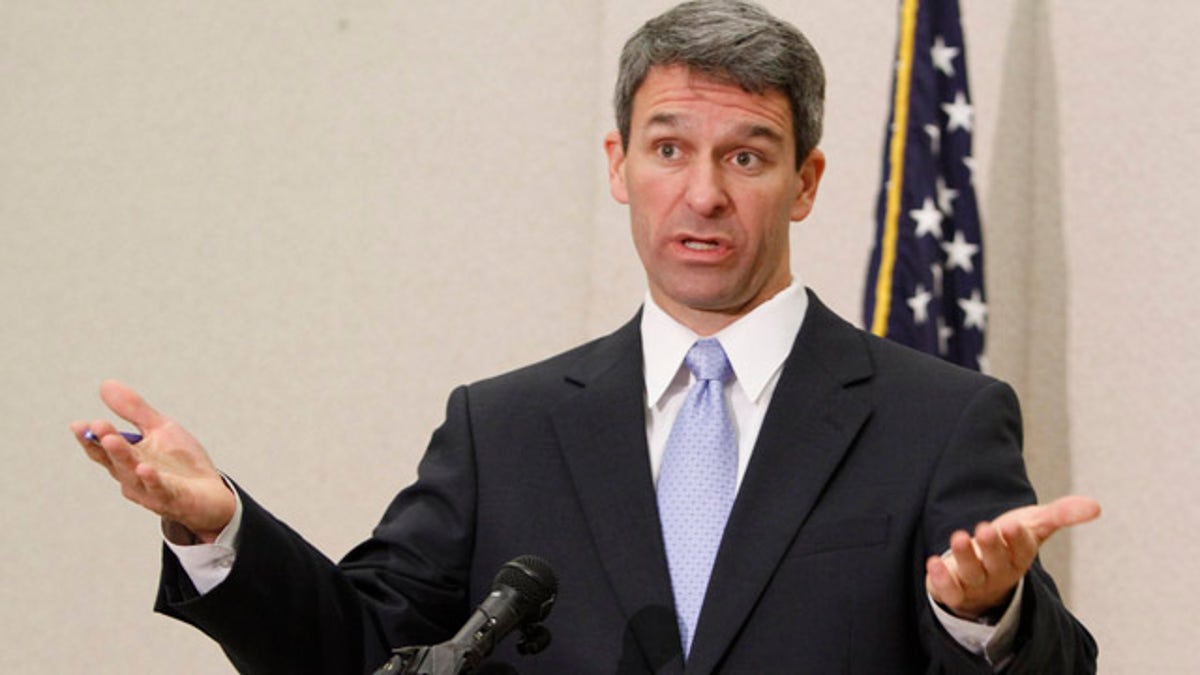
May 10, 2011: Virginia Attorney General Ken Cuccinelli gestures during a press conference after a hearing before the 4th Circuit Court of Appeals on a challenge to the federal health care reform act in Richmond, Va. (AP)
Critics of President Obama's health care overhaul will have little to cheer from the arguments heard in a federal courtroom Tuesday of the first two cases to reach appellate judges in the nationwide fight against the controversial 2010 law.
All three judges from the Fourth Circuit U.S. Court of Appeals in Richmond expressed varying degrees of skepticism over the presentation made by a law school dean who argued the law's individual and employer mandates violate the Constitution.
A ruling upholding the law, expected in the next couple of months, will certainly give a shot of confidence to the Obama administration but will have to be tempered because, as one of the judges noted Tuesday, the final fate of the measure will come from the Supreme Court.
If there's one person associated with the legal fight against the health care law more than any other, it's Virginia Attorney General Ken Cuccinelli. By the time his advocate stood up to argue -- more than 90 minutes after the court gaveled into session -- it was clear the judges were unfavorably disposed to his view that the Affordable Care Act's individual mandate requiring people to obtain insurance is unconstitutional.
If Cuccinelli does lose, it may very well be argued that it was lost before anyone actually entered the courtroom. All three of the judges who heard the case were appointed by Democratic presidents, including two who were put on the bench by President Obama. The Fourth Circuit's 14 judges are evenly divided between Republicans and Democrats and a computer randomly selected the judges that heard Tuesday's cases.
In a press conference after the case, Cuccinelli said his side did the best it could with "the hand that it was dealt" and at times praised the judges for their questions. But whatever small points that may have seemed to go in his favor, it would be hard for anyone to have walked out of the courtroom thinking that the judges will ultimately rule in Cuccinelli's favor and strike down the health care law.
The first of the two cases that were argued Tuesday was a challenge from Liberty University against the law's individual and employer mandates. The judges spent a lot of time asking Dean Mathew Staver about his contention that the mandates' penalty provisions for non-compliance are not subject to federal action under the Commerce Clause.
Judge Andre Davis was the most skeptical of Staver's arguments, at one point calling them an "abstraction." Early in the case Judge Diana Motz expressed her own misgivings about the inactivity argument but later on pressed acting U.S. Solicitor General Neal Katyal on whether he could prevail even if the court were to conclud that the law covers a person's "inactive" decision not to buy health insurance. Katyal, while not agreeing with the premise of inactivity, nonetheless affirmed his belief that the Constitution, when it comes to the financing of health care, does allow the government to effectively force people to pay for health insurance.
Motz also brought up the "broccoli" question. The law's opponents have used the colorful argument that if the federal government can force people to buy insurance it can also force people to do other things, including buying broccoli or other goods and services. But Motz put a twist on the question, asking, "could Congress prohibit people from buying broccoli?" After a lengthy discussion, Staver seemed to agree that Congress could pass such a law but couldn't pass one forcing the consumption of the vegetable.
Katyal faced a far less hostile bench during his questioning. He often ended up agreeing with assertions made by Judge James Wynn and seemed at ease standing before the judges, frequently answering questions with his forearms and elbows resting on the lectern in front of him.
He offered a broad definition of activity when he said participation in the health care market was all that was needed to show someone's involvement. On several occasions, Katyal also quoted statistics saying that $43 billion a year is spent to cover the health care costs of the uninsured. He also cited Massachusetts as a state where having a mandate has led to a control in health care costs and broader coverage for its residents.
Katyal also quickly answered an inquiry about the language of the law concerning a penalty versus a tax, saying the actual wording was secondary to the function of the provision, which is to tax people and businesses for not complying.
The case went more than twice as long as the 40 minutes allotted for arguments, which left little drama for the Cuccinelli case that immediately followed. That argument centered on whether Virginia could actually challenge the federal law.
"This case fails at the outset," Katyal said, again arguing for the government. He argued that if the Virginia case is allowed to proceed it would open up state challenges to whether its citizens should be sent overseas to fight in the U.S. military or contribute to Social Security. Judge Davis fully agreed, saying there was no limitation to the type of lawsuits states could bring.
Judges Wynn and Motz seemed troubled by the proposition that an act of a state legislature signed into law by its governor would be insufficient as grounds to enter a courtroom.




